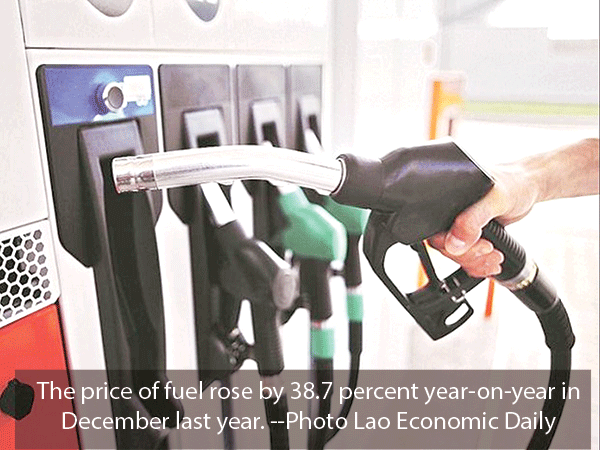Govt attempts to regulate fuel price
The government is taking steps to rein in the rising price of fuel, to ease the impact on the economy and the lives of the general public, amid a volatile global market.
Since taxes and fees represent 31-46 percent of the oil price charged in Laos, the government has decided to cut Value Added Tax from 10 to 7 percent this year.
In addition, the government has cut all fuel reserves, meaning that the current oil reserve price is now 0 kip/litre, the Ministry of Industry and Commerce’s Domestic Trade Department reported in the Lao Economic Daily last week.
The government will also review contributions to the Road Maintenance Fund, collection of import tax, excise tax, value added tax and income tax, as well as cut costs for oil importers, as part of efforts to prevent the price of fuel rising to an unacceptable level.
 |
In addition, the government is encouraging everyone to use as little fuel as possible and instead to use public transport or electric vehicles, in order to reduce the amount of petrol imported.
Authorities warn that businesses that stockpile fuel or raise the price of petrol without government approval will be penalised.
Since the start of this year, fuel prices have risen four times, causing increasing concern about the spiralling cost of consumer goods.
Steady depreciation of the kip is making it even harder to curb the rising cost of oil imports and slow inflation.
Motorists in Vientiane now pay 16,190 kip for one litre of premium grade petrol, 14,280 kip for regular grade petrol, and 12,520 kip for diesel.
The retail price of fuel is made up of the world market price (48-63 percent), taxes and fees (31-46 percent), and the service fees charged by local businesses (6 percent).
According to a Financial Post report last week, the oil price on the world market has soared to over US$100 a barrel, with every sign it will rise higher due to a supply-demand mismatch.
The surge in fuel consumption has compounded the fact that nations in the OPEC+ producer alliance are not managing to pump as much crude as they could. In addition, the situation in Ukraine has a large bearing on global fuel prices.
Meanwhile in Thailand, the Thai government recently cut the excise tax on diesel by 3 baht per litre for a period of three months, down from 5.99 baht, to ease the impact of high fuel prices.
The rising cost of fuel is one of the main drivers of inflation in Laos. The cost of motorbike services in central Vientiane has risen following the latest increase in fuel prices.
In 2016, Laos imported almost two billion litres of fuel, worth more than US$1 billion.
By Somsack Pongkhao
(Latest Update February 22, 2022) |